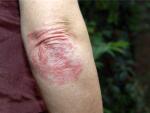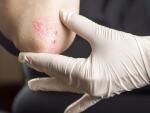
In the United States alone, about 7.5 million people have psoriasis. The most common type, which affects about 80% of people with the condition, is plaque psoriasis. Like rheumatoid arthritis and multiple sclerosis, psoriasis is an autoimmune disease that isn't well understood. While the cause of psoriasis is still a mystery, researchers suspect that there is a genetic component. And we do know what triggers flare-ups of psoriasis. Stress, injuries to the skin (like sunburn), and certain medications, such as lithium, propranolol (a blood pressure drug) and drugs used to fight malaria can all trigger psoriasis activity.
Treatment is Crucial
Psoriasis can be uncomfortable, itchy, painful, and just plain embarrassing. And the emotional impact of psoriasis can be severe. According to a published brief from the National Psoriasis Foundation, people with psoriasis are twice as likely as someone in the general population to have suicidal thoughts. Psoriasis also puts people at higher risk of depression and anxiety. To stay physically and mentally healthy, it’s important to find the best treatment for your condition.
Classify Your Case
Psoriasis isn't the same for every person who has it. In order to get the best treatment for your psoriasis, it’s important to determine how severe your case is. Dermatologists generally classify a person's psoriasis as mild, moderate or severe. There are two pieces to consider when grading the severity of your psoriasis: the percentage of your body covered by psoriasis (called Body Surface Area, or BSA), and the amount the disease impacts your life.
A mild case of psoriasis means less than 3% of your body is covered in dry, scaly patches. In moderate cases, 3 to 10% of the body is covered, and severe cases mean more than 10% is covered. To measure your psoriasis surface area, your doctor will use a tool called the Psoriasis Area Severity Index (PASI), but you can get a general idea just by using the palm of your hand, since the size of your palm equals roughly 1% of your body. For example, in a mild case of psoriasis, you might have 1 to 2 palm-sized patches on your body (which roughly equals 1 to 2% of your body surface area).
Another way to determine the severity of psoriasis is to consider how much it interferes with your quality of life. For example, if you have only one palm-sized patch of psoriasis, but it's in a highly visible place and interferes with your work or personal relationships, your case could be classified as moderate to severe, and your treatment might be more aggressive.
Getting Started
For appropriate medical care, it's important to find a dermatologist who is experienced in treating psoriasis and up to date on treatment advances. While topical treatments may work for mild cases of psoriasis, they're generally not enough for people whose psoriasis is classified as moderate to severe.
If your psoriasis symptoms are not getting better and are interfering with your life, talk with your dermatologist about other treatments, such as phototherapy. A newer class of drugs called biologics has shown great promise in treating moderate to severe plaque psoriasis. Biologics are often combined with other treatments for the best results. Biologics can be expensive and may cause major side effects, such as serious infections and blood conditions, But for some people, they improve symptoms greatly. Everyone responds to drugs differently, including biologics, so work with your doctor until you find the right treatment plan.





























